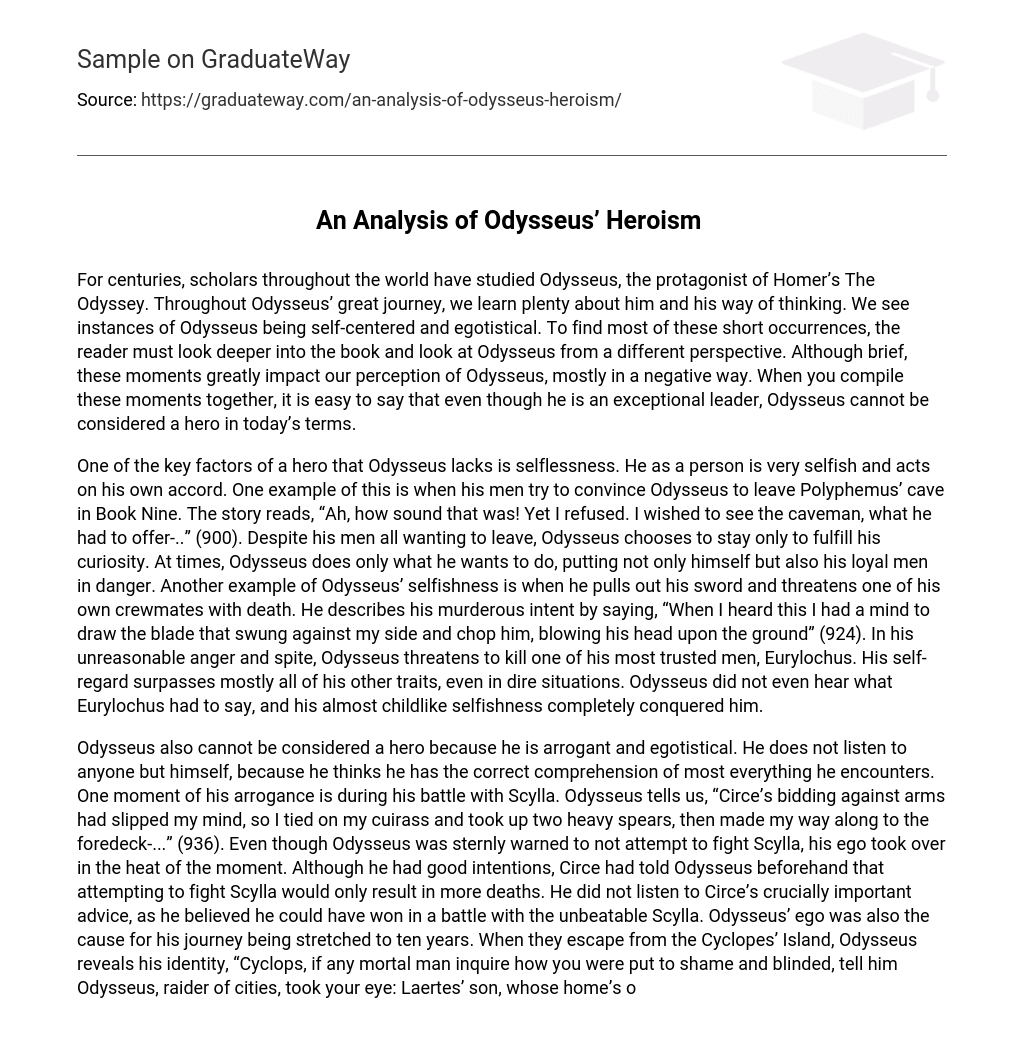For centuries, scholars throughout the world have studied Odysseus, the protagonist of Homer’s The Odyssey. Throughout Odysseus’ great journey, we learn plenty about him and his way of thinking. We see instances of Odysseus being self-centered and egotistical. To find most of these short occurrences, the reader must look deeper into the book and look at Odysseus from a different perspective. Although brief, these moments greatly impact our perception of Odysseus, mostly in a negative way. When you compile these moments together, it is easy to say that even though he is an exceptional leader, Odysseus cannot be considered a hero in today’s terms.
One of the key factors of a hero that Odysseus lacks is selflessness. He as a person is very selfish and acts on his own accord. One example of this is when his men try to convince Odysseus to leave Polyphemus’ cave in Book Nine. The story reads, “Ah, how sound that was! Yet I refused. I wished to see the caveman, what he had to offer-..” (900). Despite his men all wanting to leave, Odysseus chooses to stay only to fulfill his curiosity. At times, Odysseus does only what he wants to do, putting not only himself but also his loyal men in danger. Another example of Odysseus’ selfishness is when he pulls out his sword and threatens one of his own crewmates with death. He describes his murderous intent by saying, “When I heard this I had a mind to draw the blade that swung against my side and chop him, blowing his head upon the ground” (924). In his unreasonable anger and spite, Odysseus threatens to kill one of his most trusted men, Eurylochus. His self-regard surpasses mostly all of his other traits, even in dire situations. Odysseus did not even hear what Eurylochus had to say, and his almost childlike selfishness completely conquered him.
Odysseus also cannot be considered a hero because he is arrogant and egotistical. He does not listen to anyone but himself, because he thinks he has the correct comprehension of most everything he encounters. One moment of his arrogance is during his battle with Scylla. Odysseus tells us, “Circe’s bidding against arms had slipped my mind, so I tied on my cuirass and took up two heavy spears, then made my way along to the foredeck-…” (936). Even though Odysseus was sternly warned to not attempt to fight Scylla, his ego took over in the heat of the moment. Although he had good intentions, Circe had told Odysseus beforehand that attempting to fight Scylla would only result in more deaths. He did not listen to Circe’s crucially important advice, as he believed he could have won in a battle with the unbeatable Scylla. Odysseus’ ego was also the cause for his journey being stretched to ten years. When they escape from the Cyclopes’ Island, Odysseus reveals his identity, “Cyclops, if any mortal man inquire how you were put to shame and blinded, tell him Odysseus, raider of cities, took your eye: Laertes’ son, whose home’s on Ithaca!” (911) If Odysseus had not told Cyclops his name, Cyclops would not be able to curse him. However, Odysseus doing so caused tremendous stress for his family back in Ithaca and led to the eventual deaths of all of his men. Odysseus was at fault for causing the deaths of all his men, and it would surely have been avoided if he had just swallowed his pride.
Odysseus can be seen as hypocritical, which severely takes away from being a hero. This negative trait is especially unfavorable when we look at some of the things that Odysseus has done because of his bigotry. Firstly, Odysseus criticized Polyphemus for being a bad host and not respecting them as guests. However, Polyphemus’ actions were warranted, since Odysseus had been a rude guest. For instance, Homer wrote, “We lit a fire, burnt an offering, and took some cheese to eat;” (900). Odysseus and his men had not only barged into his living space without permission, but also started eating his accumulated food. If Odysseus truly thought that the host had to have been respectful towards the guest no matter the situation, then that would only strengthen his hypocritical beliefs. By that logic, he would also be considered a bad host for slaughtering the suitors. Speaking of killings, Odysseus also ended up killing the maids who had slept with the suitors while he was away. This makes Odysseus more of a hypocrite since he slept with Circe and did not even want to go home for around an entire year. If he had been truly unloyal to his wife, why would he kill off the maids? Although a hero can have flaws, an unruly amount of them can take away from their heroic traits, and this is the exact result of his hypocrisy.





